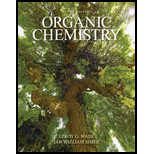
(a)
Interpretation:
The accomplishment of given synthesis in good yield has to be stated.
Concept introduction:
Chemical species that has negative charge or lone pair of electron on it are known as nucleophille. Nucleophille attack on electron deficient atom and give addition or substitution products depending upon the bond strength of leaving group.
(b)
Interpretation:
The accomplishment of given synthesis in good yield is to be stated.
Concept introduction:
Chemical species that has negative charge or lone pair of electron on it are known as nucleophille. Nucleophille attack on electron deficient atom and give addition or substitution products depending upon the bond strength of leaving group.
(c)
Interpretation:
The accomplishment of given synthesis in good yield is to be stated.
Concept introduction:
Chemical species that has negative charge or lone pair of electron on it are known as nucleophille. Nucleophille attack on electron deficient atom and give addition or substitution products depending upon the bond strength of leaving group.
(d)
Interpretation:
The accomplishment of given synthesis in good yield is to be stated.
Concept introduction:
Chemical species that has negative charge or lone pair of electron on it are known as nucleophille. Nucleophille attack on electron deficient atom and give addition or substitution products depending upon the bond strength of leaving group.
(e)
Interpretation:
The accomplishment of given synthesis in good yield is to be stated.
Concept introduction:
(f)
Interpretation:
The accomplishment of given synthesis in good yield is to be stated.
Concept introduction:
Sodium borohydride is a reducing agent and is more reactive than lithium aluminium hydride. It is used to reduce aldehyde and
(g)
Interpretation:
The accomplishment of given synthesis in good yield is to be stated.
Concept introduction:
Chemical species that has negative charge or lone pair of electron on it are known as nucleophille. Nucleophille attack on electron deficient atom and give addition or substitution products depending upon the bond strength of leaving group.
(h)
Interpretation:
The accomplishment of given synthesis in good yield is to be stated.
Concept introduction:
Chemical species that has negative charge or lone pair of electron on it are known as nucleophille. Nucleophille attack on electron deficient atom and give addition or substitution products depending upon the bond strength of leaving group.
Want to see the full answer?
Check out a sample textbook solution
Chapter 21 Solutions
Organic Chemistry (9th Edition)
- Aldehydes and ketones react with thiols to yield thioacetals just as they react with alcohols to yield acetals. Predict the product of the following reaction, and propose a mechanism:arrow_forwardShow how to convert the given starting material into the desired product. Note that some syntheses require only one step, whereas others require two or more.arrow_forwardSynthesis . Show how you would carry out the following transformations. You may use any solvents, organic and/or inorganic reagents. A mechanism is not necessary but you must provide the correct products for each step.arrow_forward
- propose a synthesis for the following molecule starting from benzene. There is no need to show the mechanism, just show all reagents and conditions that need to be used on each steparrow_forwardThe following transformation was achieved through a multistep synthesis. Propose steps to synthesize the product shown below from the reactant provided. Provide all reagents and intermediate products Brarrow_forwardShow how you would synthesize the following compound using 4-methylhex-1-ene starting material and any reactions we have talked about in this course.arrow_forward
- Show how to bring about the following transformation.arrow_forwardSynthesize the following compounds from the given starting material. You can add on any alkyl/ alkyl halide under 8 carbons or any necessary inorganic reagent needed (this includes triphenyl phosphine (Ph3P). Please draw all intermediates and reagents necessary to get to the productarrow_forwardPropose a synthesis of the following molecule starting with benzene. Be sure to show all reagents and products formed along the way. You do NOT need mechanisms here.arrow_forward
- Show how you would prepare each of the following products from the given starting materials. Where more than one step is required, show each step distinctly.arrow_forwardShow the starting material(s) and reagents need to synthesize (one step) the following product using carbonyl a carbon chemistry.arrow_forwardShow how you would accomplish the following syntheses.benzonitrile ¡ propiophenonearrow_forward

 Organic Chemistry: A Guided InquiryChemistryISBN:9780618974122Author:Andrei StraumanisPublisher:Cengage Learning
Organic Chemistry: A Guided InquiryChemistryISBN:9780618974122Author:Andrei StraumanisPublisher:Cengage Learning Organic ChemistryChemistryISBN:9781305580350Author:William H. Brown, Brent L. Iverson, Eric Anslyn, Christopher S. FootePublisher:Cengage Learning
Organic ChemistryChemistryISBN:9781305580350Author:William H. Brown, Brent L. Iverson, Eric Anslyn, Christopher S. FootePublisher:Cengage Learning


